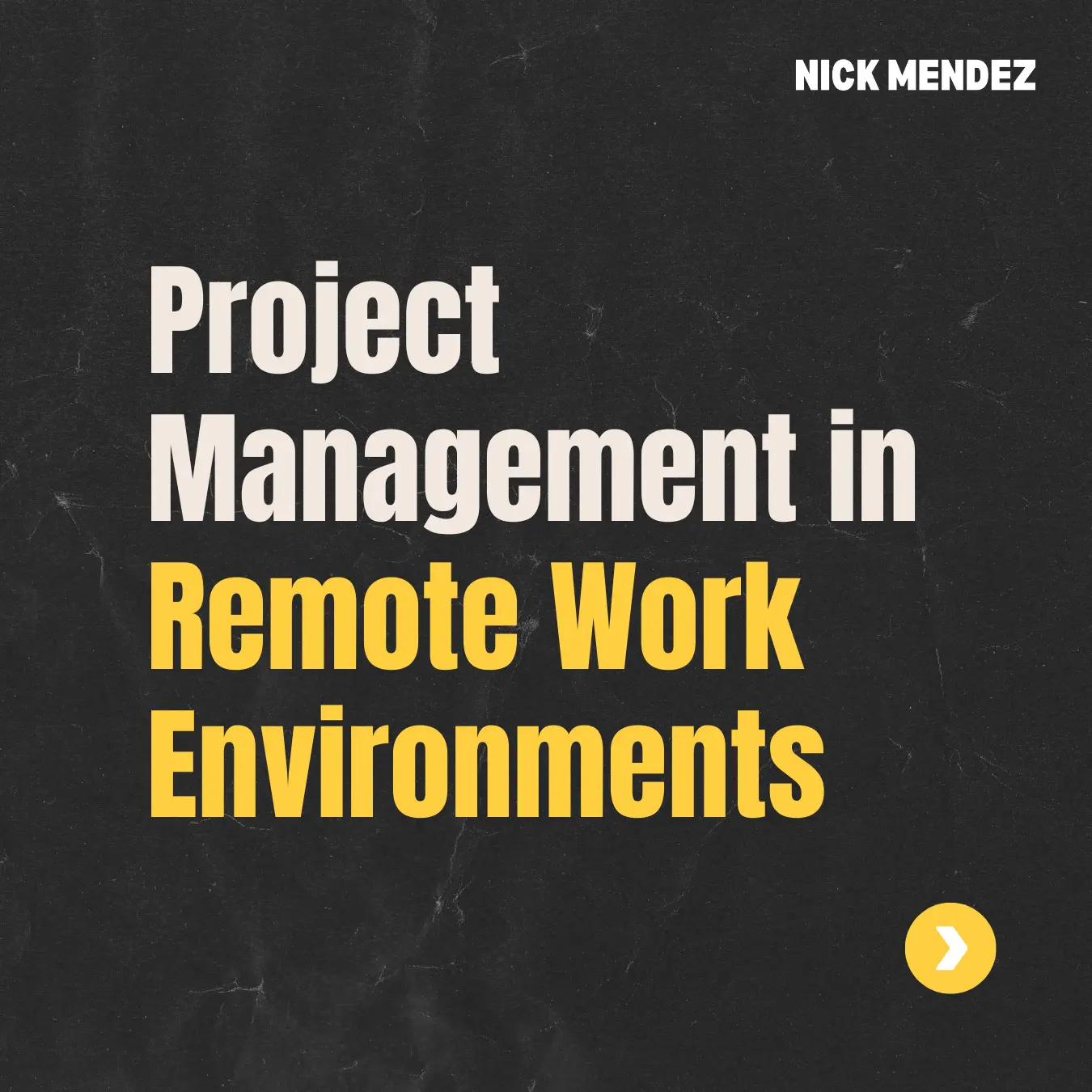Project Management in Remote Work Environments
Table of Contents

About the Author – About Nicholas Mendez (Nick Mendez):
Nicholas Mendez (Nick Mendez) is a 26-year-old tech professional with 5+ years of cyber security, and technology project management experience. He earned his PMP certification on April 30, 2023, marking a significant milestone in his career. Since then, he’s written many guest posts and blog posts where readers have received a great amount of value and knowledge to prepare for their PMP exam.
Check out his FREE exclusive top-notch PMP study resources at nickmendez.co and his upcoming website teachmeit.co and get ready to take your career to the next level!

Curious about the challenges of managing projects in today’s remote work landscape? With the rapid shift to virtual environments, project management practices have evolved to meet the demands of dispersed teams. Let’s dive into practical strategies and insights tailored for effective project management in remote work settings.
Establish Clear Communication Channels
Clear communication is paramount in remote teams to ensure alignment, collaboration, and productivity. Effective communication develops transparency, reduces misunderstandings, and builds trust among team members who may be geographically dispersed.
Information sharing and collaboration are made easy by using a range of platforms and tools designed for remote communication, including project management software, instant messaging, and video conferencing. A cohesive remote work environment is fostered when communication norms and expectations are established, including response times, meeting schedules, and preferred communication channels.
Utilize Project Management Tools
Project management tools tailored for remote teams play a pivotal role in facilitating efficient collaboration and task management across dispersed team members. These tools typically offer features such as task assignment, progress tracking, file sharing, and communication capabilities, all centralized in one platform.
When selecting remote project management software, it’s essential to look for features that support remote work dynamics, such as real-time collaboration, integration with other tools, and mobile accessibility. Whether you’re managing an e-commerce project or a software development team, leveraging specialized services can make all the difference. Consider exploring app development services to enhance your project management approach. With these tools, remote teams can streamline workflows, enhance transparency, and manage projects more effectively regardless of geography, improving productivity and results.
Set Clear Goals and Expectations
Setting clear goals and expectations in remote projects ensures alignment, focus, and accountability among team members. By clearly defining project goals, objectives, and expectations from the outset, remote teams can establish a shared understanding of project priorities and outcomes.
Techniques for defining project goals and milestones may include conducting kickoff meetings to clarify project objectives, breaking down larger goals into smaller, actionable tasks, and setting measurable milestones to track progress. As a result, transparency and accountability are promoted within the team, eliminating misunderstandings and promoting a unified approach.
Make Sure Everyone’s On The Same Page
Ensuring alignment and understanding among remote team members is essential for effective collaboration and project success. Regular communication and collaboration sessions, such as virtual team meetings, stand-ups, and progress updates, enable remote team members to stay informed, address any challenges or discrepancies, and maintain alignment with project goals and expectations.
Check Out Nifty Tools For Collaborating
Collaboration tools and platforms for document sharing, version control, and task management make communication and coordination easier, ensuring everyone is on the same page and working towards the same goals. Creating a culture of transparency, open communication, and shared accountability will allow remote teams to overcome geographical barriers and succeed together.
Foster Collaboration and Team Bonding
Overcoming the challenges of remote collaboration requires intentional strategies to foster team cohesion and rapport in virtual settings. Remote teams often face obstacles such as communication barriers, feelings of isolation, and difficulty establishing trust among team members who may be geographically dispersed.
To address these challenges, organizations can implement strategies for building team cohesion, such as promoting open communication channels, encouraging regular virtual meetings, and facilitating informal interactions among team members. Virtual team-building activities, such as online games, virtual coffee breaks, or collaborative projects, can strengthen bonds and nurture a sense of belonging within the remote team, ultimately enhancing collaboration and morale.
Team Work Makes The Dream Work
Organizing virtual team-building activities and initiatives is essential for cultivating a positive team culture and strengthening relationships among remote team members. These activities can range from virtual workshops and skill-sharing sessions to online team challenges and social events.
By providing opportunities for team members to connect, collaborate, and celebrate achievements in a virtual environment, organizations can overcome the barriers of remote collaboration and create a cohesive and engaged team dynamic. Virtual team-building activities can also help boost team morale and enhance productivity by incorporating elements of fun and creativity.
Establish Remote Work Policies and Guidelines
Developing remote work policies and guidelines for project teams is essential for establishing clear expectations and promoting consistency in remote work practices. Addressing issues such as work hours, availability, and communication protocols ensures that remote team members understand their roles and responsibilities, as well as the expectations surrounding their work arrangements.
Outline Specific Guidelines
By outlining specific guidelines for remote work, organizations can develop a culture of accountability and professionalism, while also promoting work-life balance and flexibility for team members. Incorporating feedback mechanisms and opportunities for ongoing review and adjustment of remote work policies allows organizations to adapt to evolving needs and challenges, ensuring that remote teams are productive and in compliance with regulatory requirements.
It’s Important To Have Rules– And To Stick To Them
Ensuring compliance with remote work regulations and best practices is crucial for mitigating legal risks and maintaining a positive work environment for remote project teams. Organizations must stay informed about relevant laws and regulations governing remote work, such as employment contracts, data privacy regulations, and health and safety standards.
By implementing policies and procedures that align with regulatory requirements and industry best practices, organizations can demonstrate their commitment to supporting remote work while also safeguarding the rights and well-being of remote team members. The organization’s commitment to ethical and legal standards is further reinforced with regular training and communication on remote work policies.
Embrace Flexibility and Adaptability
Flexibility in remote project management entails the ability to adjust plans when unexpected obstacles arise. Whether it’s slow internet connections or team members falling ill, unforeseen circumstances can derail progress. The ability to navigate such challenges requires contingency plans and alternative approaches. Promoting a positive outlook and encouraging perseverance within the team cultivates resilience, much like strategizing in games to overcome hurdles. As a result, the team can face adversity head-on and emerge stronger.
Brainstorming Change
Adapting to changes and surprises involves brainstorming innovative solutions and workarounds. For instance, if internet connectivity becomes an issue, exploring offline work options can help maintain productivity. A supportive team environment is also encouraged by open communication and providing support during challenging times. By embracing change with a constructive mindset and supporting one another through difficulties, the team cultivates a culture of resilience and perseverance, enabling them to navigate obstacles effectively.
Implement Regular Check-Ins and Progress Updates
Regular check-ins and progress updates are super important in remote projects because they help everyone stay on the same page and know what’s happening. It’s like when you’re playing a game and you need to check in with your teammates to see how everyone’s doing. Scheduling and having effective remote meetings is a great way to do this.
Provide Support and Resources for Remote Team Members
Remote team members encounter unique challenges, such as feelings of disconnection and uncertainty about their tasks. Providing them with training, tools, and support is like offering guidance when learning to ride a bike – it steadies them and ensures they perform well. Encouraging open communication allows team members to share problems and ideas freely, encouraging a supportive environment where everyone feels included. Just like strategizing in a game, effective communication through chats and video calls ensures that everyone’s input is valued, promoting a sense of belonging and teamwork within the remote team.
Wrap Up
To effectively manage projects in remote work environments, it’s crucial to embrace key strategies such as regular check-ins, clear communication, and providing support and resources for remote team members. By implementing best practices and fostering a culture of collaboration and adaptability, organizations can leverage the opportunities presented by remote work while overcoming challenges. As we look to the future, remote project management is poised to play an increasingly significant role in team success, promoting flexibility, inclusivity, and innovation in the way we work together, regardless of geographical barriers. For insights on how AI and automation are transforming project management, read “4 Key Transformations That AI and Automation Are Revolutionizing in Project Management”.
